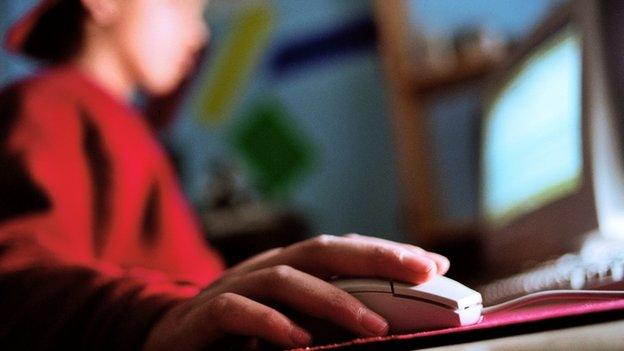Protecting children from pornography
- Published
- comments

Today's research from Nielsen for the online video regulator ATVOD confirms something not particularly surprising - that pornography on the web is very popular and is a huge business. But by showing that large numbers of children are getting unrestricted access to hardcore pornography, ATVOD is raising some difficult questions.
How worried should we be - and even if we are convinced this is harmful is there anything that can be done about it? And isn't it the job of parents, not regulators, to keep children safe online?
ATVOD has an interesting analysis of how the business model for pornography has changed, and how that has made it much more likely that children will stumble across it - or find it easier to seek out.
The regulator says that it used to be quite hard to find this material, especially without handing over credit card details. But then they took inspiration from the likes of YouTube and began to offer hours of video for nothing, making money from adverts, and getting users to "trade up" to premium services.
The result is that hardcore material is just one click away - the "tube" sites don't even post a warning site, so any child arriving on their homepages will immediately see explicit material.
Many parents will be deeply shocked by the numbers in the ATVOD report, and will doubtless cheer the regulator on as it asks the government for new powers to pursue sites that don't even try to keep children out. The problem is that just about every one of these sites is based abroad, mainly in North America.
ATVOD's idea is to follow the money - get credit and debit card companies to withdraw their facilities from the websites unless they show they are doing effective age checks. The payment firms say they will act if it is shown that the sites are breaking the law, but the regulator accepts that means new legislation.
One of the biggest operators of these pornography sites - including the one named by ATVOD as having attracted 112,000 underage visitors in December - is a business called MindGeek. It describes itself on its very respectable corporate website as "a global industry-leading information technology firm" with headquarters in Luxembourg - but on a blog it also trumpets the fact that is "the world's biggest porn site".
We contacted Mindgeek to seek a response to ATVOD's research, and its call for payment firms to stop dealing with porn firms which don't impose age restrictions. A spokeswoman in the firm's Montreal office provided a statement. She said the company did require adults to go through an age verification process in countries where that was required.
But the statement went on: "The entire issue of verifying age online is an on-going struggle with no easy solution. Unfortunately, the truth of the matter is that there is no simple answer when it comes to protecting children in a digital age."
As for blocking payments services, MindGeek claimed that would hurt its advertisers rather than its own operation - though that may hardly be a concern for the regulator.
The porn company maintains that the best approach is to help parents by promoting the use of internet filters. That's a view which may be more widely shared - the government has responded to ATVOD's report by trumpeting its action last year to make British ISPs provide family-friendly filters with the default setting switched to on.
The regulator says that filters aren't foolproof, and it's lobbying hard to get ministers to take a tougher stance. Libertarians will see this as a censorship move which in any case won't work. ATVOD accepts that there's no way of keeping all children away from online pornography, but argues that even a small reduction in the numbers will be worthwhile.
In all kinds of areas, from pornography to online gambling to illegal file-sharing, regulators are trying to exercise national control over the global web. They've had a few victories - the UK is acting to stop gambling sites reaching underage gamblers. But mostly the web remains ungovernable.